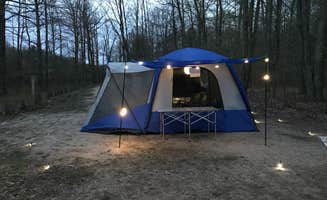Dispersed camping opportunities near Alger, Michigan extend throughout the Huron-Manistee National Forest, which spans nearly one million acres across Michigan's northern lower peninsula. The forest's terrain includes significant elevation changes with ridges rising to 300 feet above river valleys. Camping is permitted on national forest land with the requirement that sites be at least 200 feet from water sources and one mile from designated campgrounds.
What to do
Trail exploration: Connect to the North Country Trail from dispersed camping areas in the Huron-Manistee National Forest. The trail system features loop options combining the Manistee River Trail, creating a 20-mile circuit that doesn't require backtracking. "We walked this trail for 5 days and 4 nights. Cell service was spotty, which was the goal. Lots of wildlife and great views," reports Megan C., who hiked the area.
Waterfront activities: Experience the Manistee River at riverside sites throughout the forest. The river provides opportunities for swimming, kayaking and fishing. The forest's unique landscape creates interesting riverside terrain for exploration, as mentioned by backpackers who note, "Water is stream is probably safe but bring a filter or enough water to last."
Wildlife observation: Scan for local animals during early morning or dusk hours. The forest hosts diverse wildlife including white-tailed deer, wild turkey, and numerous bird species. Multiple visitors mention wildlife encounters, with one backpacker stating, "No campgrounds, but there are areas with clearings for camping. The nearest other campers were not within earshot nor could we see them. Lots of wildlife."
What campers like
Natural seclusion: Find private campsites throughout the Huron-Manistee National Forest. Backpackers appreciate the privacy at dispersed sites, as one camper notes: "Hiked five days, four nights. Connects to NCT. Bring toilet paper. No campgrounds, but there are areas with clearings for camping. The nearest other campers were not within earshot nor could we see them."
Varied terrain: Choose between riverside or ridge camping locations. The forest offers opportunities to camp at different elevations, providing diverse experiences. An experienced backpacker explains, "This forest area is unique because it offers large changes in elevation that you do not typically get in Michigan, especially not in the lower peninsula. As the trail both runs above and along the Manistee river with each mile, you have ample opportunity to camp both ridge-side and river-side."
Well-maintained trails: Access dispersed camping via clearly marked paths. The trail system remains well-kept throughout the seasons, making navigation easier for first-time visitors. One repeat visitor mentioned, "I have dispersed camped here twice now and each time is such a pleasure, the trails are always so maintained, the sites are easy to find and always marked."
What you should know
Navigation requirements: Carry proper maps and GPS when seeking free camping near Alger. The forest contains both public and private land, requiring careful navigation. "This is a vast area in which there are many campground sites with some opportunities for dispersed camping. Use a GPS system or a program to ensure you are not in private property. Have at least 3 sites as possibilities," advises one experienced camper.
Pack-in essentials: Prepare for primitive conditions as dispersed sites lack facilities. Visitors need to carry all necessities including water filtration equipment, toilet paper, and waste disposal tools. A backpacker explains, "You need to carry everything out that you carry in. Bring a garden trowel and toilet paper. There are streams with decent drinking water but I would recommend a filter anyways."
Seasonal considerations: Check weather forecasts before camping, as Michigan conditions can change rapidly. Spring often brings mud and standing water while summer offers warmer swimming opportunities. Fall camping provides colorful foliage displays, with one camper mentioning they were "so excited to go back in the fall."
Tips for camping with families
Introduce children to backpacking: Start with shorter routes for family trips. The network of trails allows for customized hiking distances suitable for various age groups. One family leader shares their success story: "We had 11 Grandkids with us, and we had 9 backpacking tents. The children all carried their own tents, sleeping bags, and food for 4 days. The River trail supplied us with our water needs for cooking and drinking, from the Manistee River. It was a fun trip for all."
Create multi-day adventures: Plan progressive campsites to keep children engaged throughout longer stays. Changing locations provides new scenery and activities each day. "We specifically stayed at the site at the end of Goverment's Landing on the river. It was amazing, my husband, myself and our two dogs had a wonderful time. We hiked all through the forest, tried lots of cool gear and discovered a new love for camping and nature," notes a visitor to the Cut River Dispersed Campsite.
Pack entertainment alternatives: Bring nature-based activities for children during downtime at camp. Items like field guides, magnifying glasses, or wildlife tracking cards can enhance the educational experience. Family campers suggest bringing gear for impromptu exploration: "We keep our Jeep ready for camping at any moment and places like this are why we do it."
Tips from RVers
RV site selection: Locate level, accessible clearings for larger vehicles. While most dispersed areas accommodate smaller rigs, fewer spots work for large RVs. Experienced campers recommend scouting potential sites before committing to a location.
Dispersed RV amenities: Access dump stations at designated locations near dispersed camping areas. Though free camping near Alger, Michigan rarely includes hookups, RVers can find necessary services at nearby facilities. The Cut River Dispersed Campsite accommodates "both tents and RVs, including big rigs" according to local information.
Self-contained requirements: Bring sufficient water and power for your entire stay. Most dispersed sites require complete self-sufficiency with no access to utilities. "Super rustic and right on the river!" notes one camper about the primitive conditions that require proper preparation.


